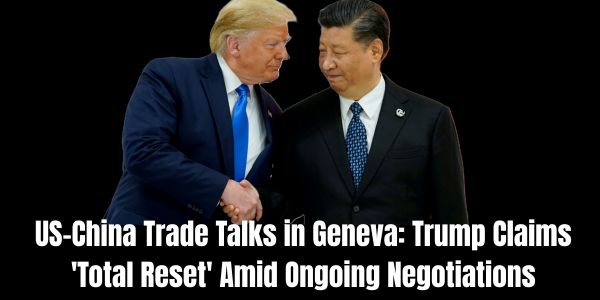Geneva, Switzerland – High-stakes trade talks between the United States and China commenced in Geneva on Saturday, May 10, 2025, marking the first face-to-face negotiations since President Donald Trump imposed 145% tariffs on Chinese imports, prompting China to retaliate with 125% levies on US goods. The discussions, held at the residence of the Swiss ambassador to the United Nations, aimed to defuse a trade war threatening global economic stability. President Trump hailed the talks as a “total reset” in US-China trade relations, but details of any agreements remain sparse as negotiations are set to continue on Sunday.
The US delegation, led by Treasury Secretary Scott Bessent and Trade Representative Jamieson Greer, met with Chinese Vice Premier He Lifeng for over 10 hours in the 18th-century Villa Saladin overlooking Lake Geneva. Trump, posting on Truth Social early Sunday, described the meeting as “very good” and claimed, “A total reset negotiated in a friendly, but constructive, manner,” emphasizing a goal of “opening up of China to American business.” He concluded, “GREAT PROGRESS MADE!!!”
Must Read: Explainer: SiteGPT, the Best Free AI Website Builder for News Websites in 2025
Despite Trump’s optimism, neither side released official statements detailing specific outcomes from the first day’s talks. China’s state-run Xinhua news agency called the meeting “an important step toward resolving the dispute,” but stressed that a resolution requires “strategic patience and determination.” The World Trade Organization’s director-general, Ngozi Okonjo-Iweala, welcomed the talks as a “positive and constructive step towards de-escalation,” noting their significance for the world’s two largest economies.
The trade war escalated after Trump, since taking office in January 2025, imposed tariffs citing unfair Chinese trade practices and insufficient action against the export of fentanyl precursors. China’s retaliatory tariffs have brought bilateral trade, valued at over $660 billion last year, to a near standstill, disrupting global supply chains and raising fears of a sharp economic downturn. The US trade deficit with China, which reached $263 billion in 2024, remains a key point of contention.
Analysts tempered expectations for a major breakthrough. Sun Yun, director of the China program at the Stimson Center, suggested that simultaneous tariff reductions by both sides would be the best-case scenario, but cautioned, “It cannot just be words.” The White House clarified that the US would not lower tariffs unilaterally, while China insisted that the US must ease its levies first. Trump had hinted on Friday at reducing tariffs to 80%, calling it a figure that “seems right,” though no such agreement was confirmed.
The talks follow weeks of heightened tensions, with both nations initially reluctant to initiate dialogue. The decision to meet in Geneva, facilitated by Switzerland’s neutral diplomatic hub, was seen as a breakthrough in itself. Swiss Economy Minister Guy Parmelin, who met both delegations on Friday, described the talks’ occurrence as “already a success.” He Lifeng is also scheduled to meet with Okonjo-Iweala during his stay, signaling broader international engagement.
Global markets and businesses, heavily reliant on US-China trade, are closely watching the negotiations. The tariffs have driven up costs for American consumers, with Goldman Sachs analysts predicting inflation could double to 4% by year-end. Imports from China, including electronics, toys, and textiles, are expected to fall 20% in the second half of 2025, according to the National Retail Federation.
As talks resume on Sunday, the world awaits clarity on whether Trump’s “total reset” reflects tangible progress or rhetorical optimism. For now, the Geneva meetings represent a critical step toward easing a trade war that has rattled economies worldwide, but a comprehensive resolution remains uncertain.

